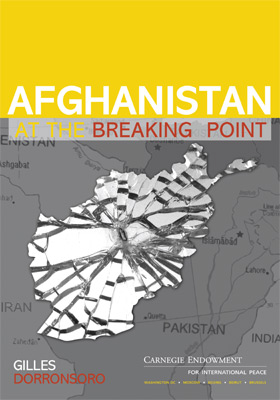Gilles Dorronsoro

Afghanistan at the Breaking Point
The United States should pursue a political, rather than military, solution to the conflict in Afghanistan that includes a cease-fire and negotiations with the insurgents.
The current strategy of defeating the Taliban militarily is unrealistic. The coalition is on the defensive across much of Afghanistan and, with current troop levels, can at most only contain the insurgency. On present course, the coalition is swiftly heading toward an impasse.
Just to retain the areas currently controlled by the coalition would require significant additional troops next year. Many more than that would be required for the coalition, with heavy losses, to adopt an offensive stance and win back territory. Such an escalation, though, is politically untenable given the impending departure of European forces and dwindling public support for the war. A new strategy is required.
Rather than committing more troops, the United States should instead pursue a political solution to the conflict, including a cease-fire and negotiations with the insurgents. By insisting on power-sharing among the various Afghan factions and reserving the right to intervene militarily to prevent Afghanistan from becoming a sanctuary for extremist groups, the United States can still accomplish the more limited objective of preventing the return of al-Qaeda.
However, the United States must act quickly. Given the rapidly deteriorating security situation, every passing month strengthens the position of the Taliban. A viable exit strategy is still possible, but time is not on America’s side.
President Obama and U.S. military leaders must keep five important truths in mind as they review the Afghanistan war strategy:
- Optimistic assessments. The U.S. command sees the situation in Afghanistan in overly positive terms and this jeopardizes its credibility with decision makers and public opinion.
- Unrealistic objectives. American commanders cannot defeat the Taliban militarily and can at best contain the insurgency in most provinces.
- Irreversible advances. As the Taliban strengthens and the Afghan government weakens, turning over security to the Afghan army is impossible in the near term.
- Escalating troop numbers. The current military option will only lead to an increase in U.S. troops to counter the insurgency’s rise and the withdrawal of European forces.
- Take the initiative. The Obama administration must push for negotiations with the insurgency and a cease-fire rather than be boxed into dead-end military logic.
About the Author

Former Nonresident Scholar, South Asia Program
Dorronsoro’s research focuses on security and political development in Afghanistan. He was a professor of political science at the Sorbonne in Paris and the Institute of Political Studies of Rennes.
- Waiting for the Taliban in AfghanistanPaper
- Afghanistan: The Impossible TransitionPaper
Gilles Dorronsoro
Recent Work
Carnegie does not take institutional positions on public policy issues; the views represented herein are those of the author(s) and do not necessarily reflect the views of Carnegie, its staff, or its trustees.
More Work from Carnegie Endowment for International Peace
- Iran Is Pushing Its Neighbors Toward the United StatesCommentary
Tehran’s attacks are reshaping the security situation in the Middle East—and forcing the region’s clock to tick backward once again.
Amr Hamzawy
- Modernizing South Asia’s Borders Through Data-Driven ResearchArticle
Cargo time release studies offer a path to greater economic gains and higher trust between neighboring countries.
Nikita Singla
- The Gulf Monarchies Are Caught Between Iran’s Desperation and the U.S.’s RecklessnessCommentary
Only collective security can protect fragile economic models.
Andrew Leber
- Duqm at the Crossroads: Oman’s Strategic Port and Its Role in Vision 2040Commentary
In a volatile Middle East, the Omani port of Duqm offers stability, neutrality, and opportunity. Could this hidden port become the ultimate safe harbor for global trade?
Giorgio Cafiero, Samuel Ramani
- Europe on Iran: Gone with the WindCommentary
Europe’s reaction to the war in Iran has been disunited and meek, a far cry from its previously leading role in diplomacy with Tehran. To avoid being condemned to the sidelines while escalation continues, Brussels needs to stand up for international law.
Pierre Vimont








